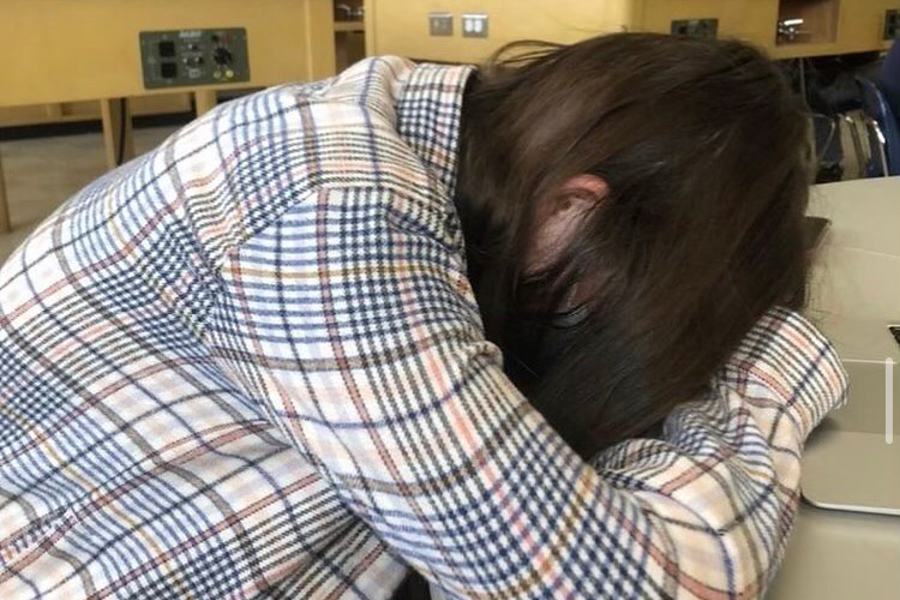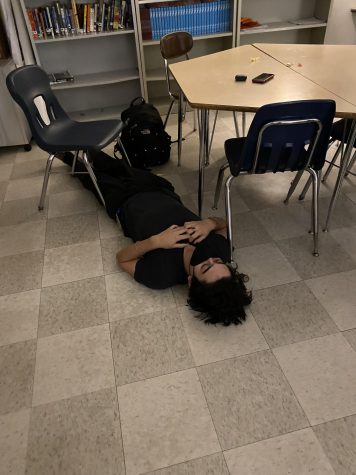Caffeine or sleep? Examining students’ sleep habits
South high student Clara Conry sleeping at a table at South High.
June 24, 2022
How much sleep do you get? High school students are known for staying up late and getting very small amounts of sleep. This has had a variety of impacts, from increased health risks to instagram accounts that post pictures of students sleeping at school. To learn more about student sleeping habits at South High, The Southerner asked the students and staff: here’s what we found.
Out of 151 responses to the survey, with a mix of all grades and multiple teachers and staff, respondents got an average of 7 hours and 28 minutes on weekdays. According to the Nationwide Children’s hospital, this is above the national average for teens at between 7 hours and 7 hours and 15 minutes. However, it is still significantly less than what they recommend for teenagers, which is between 9 and 9 hours and 15 minutes.
Caffeine intake is heavily correlated with sleep. On average, people who responded that they “rarely to never” consume caffeine got about 7 hours and 50 minutes of sleep on weekdays. This is around 22 minutes more than the school average. Responses that selected “yes, but not every day” to the same question got less sleep, at an average of 7 hours and around 25 minutes of sleep, 3 minutes less than average. Most outlying, but possibly not surprising, is the data for people that responded “Yes, every day” to the question. Those 26 respondents got, on average, 6 hours and 48 minutes of sleep. This is not only 40 minutes less than the overall average, but more than an entire hour less sleep than the average sleep for people that rarely or never consume caffeine. These people also got less than the national average for teens.
The next interesting facts are how schoolwork influences sleep. For people that answered “Yes, significantly,” “Yes, somewhat,” and “Maybe a little” to the question “Would you say that your schoolwork significantly impacts the amount of sleep you get?,” the averages were 7 hours 28 minutes, 6 hours 48 minutes, and 7 hours 18 minutes respectively. The outlier here was for those that answered “No” to the same question. These respondents got, on average, 9 hours and 57 minutes of sleep. Although the data was somewhat varied for those that felt that their schoolwork impacted their sleep to some degree, there is an obvious correlation between schoolwork not impacting sleep and getting large amounts of sleep. Another interesting thing to note is that this final group of respondents that felt that their schoolwork did not impact their sleep was the only single group whose average sleep surpassed the amount recommended by the Nationwide Children’s hospital.
For all of these statistics, it’s important to remember that there is no way to tell exactly what is going on. For example, we might assume that people consume more caffeine because they are getting less sleep and want to have energy in the morning. But, this statistic could also be caused by people consuming more caffeine at night which leads to getting less sleep. However, there is a large enough sample size that we can draw somewhat substantial conclusions through correlation that things like caffeine and schoolwork either directly or indirectly affect the amount of sleep students get.
Much of the data is somewhat expected. The people that are getting the least sleep are consuming the most caffeine in order to be more awake, and people whose schoolwork doesn’t impact their sleep get more. But, while South High students seem to be mostly above average, they are still not getting the recommended hours. In order to get a proper night’s rest and maximize health, students need to be getting more sleep.






